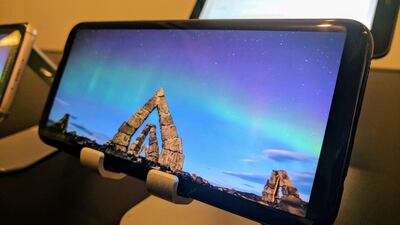One way to get a sense of where the technology industry winds are currently blowing is to take a look at which companies Samsung is emulating.
By that measure, judging by the host of products announced by the South Korean electronics giant this week, Apple is yesterday’s news. It’s a Google and Amazon world we’re living in now.
Samsung’s marquee new product is, of course, the Galaxy S8 and its larger S8 Plus sibling. The flagship smartphones, going on sale in certain markets in April, will be hugely important for the company.
The S8 is Samsung’s effort at a rebound from the unmitigated disaster that was the Galaxy Note 7, which was subject to a global recall and then cancellation because of faulty batteries. The fiasco is costing Samsung billions of dollars in lost profits and brand damage.
I had some time with the new Galaxy devices at a press event in New York this week, and they look solid. Whether the batteries can keep from exploding, only time will tell.
The S8 phones have been redesigned so that they’re almost all screen now. Their physical home buttons have been removed and replaced with a virtual one built right into the displays. The same goes for the fingerprint sensor.
About 83 per cent of the devices’ surface areas are now displays, according to Samsung. There’s almost no bezel, so that’s a lot of visual real estate on the 5.8-inch S8 and the 6.2-inch S8 Plus.
The devices’ big new feature, however, is the addition of Bixby, Samsung’s take on the personal voice assistant. Bixby can answer trivia questions, set calendar events and provide general help based on predicting its users’ behaviour. If you call your spouse every day at a certain time, for example, it will eventually remind you to do so if you forget.
It’s hard not to draw comparisons to Google Assistant, which launched on Google’s Pixel phones in the autumn and recently expanded to other Android devices. Samsung says Bixby has a leg up on its competitor because it also has visual intelligence. Point your phone’s camera at a product, for example, and it will bring up a list of places online where that item can be purchased.
There are existing apps out there that perform similar functions, including Google Goggles, so it remains to be seen how this function is unique or whether it really is an advantage.
One thing is certain at this point – Samsung feels like it has to be in the artificial intelligence space because of what its competitors are doing.
Google Assistant is itself a response to Amazon’s artificially intelligent Alexa tool, which is quickly invading a wide cross-section of products, from home speakers and appliances to cars. Amazon recently added Alexa capability to its iPhone app, which means the company is going to make inroads in the mobile world despite not even having its own phone.
Alexa is ironically competing with Apple’s own AI assistant Siri on the iPhone, a situation that Samsung also now finds itself in. Since the Galaxy S8 is an Android device, users will be able to choose between Bixby and Google Assistant.
In both cases, Amazon and Google hold big leads over Apple and Samsung in what is becoming an increasingly important technology.
Besides Bixby, the South Korean company is also emulating Google with several other new products. The upcoming Samsung Connect Home is similar to Google Wi-Fi, a home router released by the search company late last year. Both aim to deliver better Wi-Fi connections and home automation.
Samsung is also adding a hand-held controller to its Gear VR virtual reality headset. The cynic might suggest it’s a blatant copy of the controller included with Google’s Daydream View headset, which launched last autumn.
The new product line-up brings up memories of Apple suing Samsung in 2011 for allegedly copying the iPhone and iPad. Apple charged that Samsung had ripped off basic ideas with its Galaxy line-up, including the look and feel of the respective products.
US courts agreed and awarded Apple hundreds of millions of dollars in damages. The final amount is still being disputed in appeals courts.
There isn’t much trace of Apple’s products in Samsung’s new line-up, but it probably isn’t because of any remaining sting from that lawsuit. It’s more likely because the iPhone maker hasn’t done much of interest in years.
The real action is coming from Google and Amazon. And now, just like then, Samsung doesn’t want to get left behind.
The tech week’s winner and loser
Winner of the Week: Souq.com. After months of speculation, the Dubai-based online marketplace has finally been acquired by Amazon. While it might not have fetched the billion-dollar valuation the company had previously been estimated it, the sale still represents a win for investors and saves Souq from the difficult task of finding growth opportunities.
Loser of the Week: American internet users. The US Congress on Tuesday voted against online privacy rules, thereby allowing internet providers to sell information on consumers' browsing habits to advertisers without their consent.
Peter Nowak is a veteran technology writer and the author of Humans 3.0: The Upgrading of the Species.
business@thenational.ae
Follow The National's Business section on Twitter

